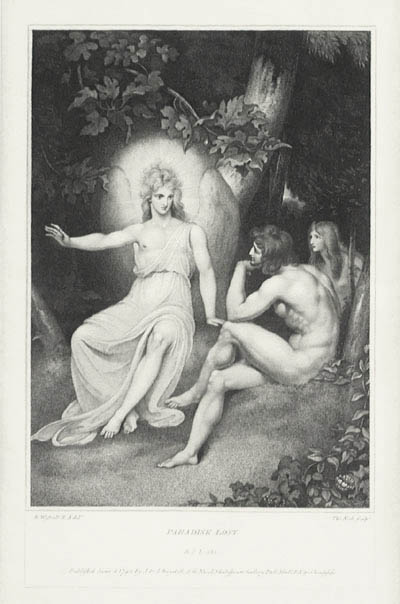Thursday – Thanksgiving
Reprinted from Nov. 28, 2010, slightly revised
In the spirit of Thanksgiving, I share here some of Milton’s insights into gratitude, starting with the prayer that Adam and Eve offer up to God in Book IV. They have been working in the garden and now are walking hand in hand to their “blissful bower.” Before an evening of lovemaking (Milton somewhat controversially believed that there was sex before the fall), they turn and in unison offer thanks to God. Milton describes their thanksgiving as “adoration pure”:
Thus, at their shady lodge arrived, both stood,
Both turned, and under open sky adored
The God that made both sky, air, earth, and heaven,
Which they beheld, the moon’s resplendent globe,
And starry pole: “Thou also madest the night,
Maker Omnipotent, and thou the day,
Which we, in our appointed work employed,
Have finished, happy in our mutual help
And mutual love, the crown of all our bliss
Ordained by thee; and this delicious place
For us too large, where thy abundance wants
Partakers, and uncropt falls to the ground.
But thou hast promised from us two a race
To fill the earth, who shall with us extol
Thy goodness infinite, both when we wake,
And when we seek, as now, thy gift of sleep.”
In contrast to Adam and Eve, Satan thinks that gratitude is all about puffing up the ego of God. God has given the world infinite gifts, which in Satan’s eyes puts everyone in eternal debt. To quote him directly, we incur “the debt immense of endless gratitude,/So burthensome still paying, still to owe.” Satan focuses on owing because he himself is a supreme egotist. As he sees it, the powerful give gifts in order to display their power. He cannot realize that God has given us gifts, not because he wants or needs our praises, but because the ability to praise him is itself a gift. When we express gratitude, we ourselves experience joy.
Actually, Satan is not dumb (after all, he has been the archangel) and understands to a point. In the soliloquy I am referring to (in Book IV), he acknowledges that our gratitude to God is not a burden. In a moment of honesty that makes him interesting as a character, he acknowledges that expressing gratitude is not a burden at all—that we want to give thanks. In the very act of giving thanks, we are discharged of the debt–or as Satan puts it, we are “at once indebted and discharged.” Here’s the passage in its entirety:
I ‘sdained subjection, and thought one step higher
Would set me highest, and in a moment quit
The debt immense of endless gratitude,
So burthensome still paying, still to owe;
Forgetful what from him I still received
And understood not that a grateful mind
By owing owes not, but til pays, at once
Indebted and discharged; what burden then?
Once he acknowledges that he has been in the wrong, does Satan turn from his evil and repent? Obviously not, and the remainder of the soliloquy is a series of rationalizations about why he will continue doing evil.
I conclude with one other expression of gratitude in the poem, this one coming from God’s angels. Through them one sees that praising God fills one up. Theirs is the joy of musicians who have found a subject that inspires them and propels them to great heights. To repeat the point from earlier, God doesn’t need musicians singing praises to him. Rather, he has given them a gift—the chance to be filled with God’s joy—that will allow them to find fulfillment:
…their golden harps they took,
Harps ever tuned, that glittering by their side
Like quivers hung, and with preamble sweet
Of charming symphony they introduce
Their sacred song, and waken raptures high;
No voice exempt, no voice but well could join
Melodious part, such concord is in Heav’n. . .Thus they in Heav’n, above the starry sphere
Their happy hours in joy and hymning spent.
Even if you don’t believe in God, trying thinking of the matter this way: Ask yourself what it is that provides you with deepest joy. What inspires and fills you up, giving you a sense that you are filling your highest purpose? Whatever it is, label it God.


